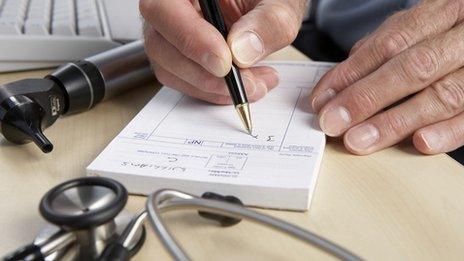Patients 'facing longer GP waits', warns BMA
- Published
- comments

Longer waits to see a GP in the UK are "becoming the norm", the British Medical Association is warning.
BMA GP leader Dr Chaand Nagpaul said "chronic underfunding" meant patients were often having to wait one or two weeks for an appointment.
Some patients struggled to get an appointment, he said. Data from the GP patient survey in England shows one in 10 could not last time they tried.
The government said measures addressing the issue were already in place.
Dr Nagpaul will highlight the issue of funding coupled with rising demand in a speech at the BMA's annual conference on Wednesday.
He will point out that annual consultations have risen by 40 million in England alone since 2008, hitting 340 million a year at the last count.
But he will tell delegates in Harrogate that the increase has come at a time when the amount spent on general practice as a share of the NHS budget has been falling.
Complex conditions
Figures from the Royal College of GPs show that in 2005-6 it stood at 10.7% of NHS spending, but by 2011-12 it had dropped to 8.4%.
Ahead of the speech Dr Nagpaul told the BBC: "Demand is outstripping supply. The patients we are seeing have more complex conditions and yet we still only have 10 minutes for each consultation - that is woefully inadequate.
"General practice is chronically under-funded and that is beginning to have an impact on the patient experience."
He added waits of "one or two weeks were becoming the norm" for patients, although he said those needing urgent appointments would always be seen quickly.
His warning was backed up by the Patients Association.
Its chief executive, Katherine Murphy, said: "We hear daily from patients that they can't get appointments. It's even worse for those who want a named doctor for continuity of care. They are having to wait two or three weeks. It is becoming a real issue.
"We need more investment in general practice, but I think we also need greater flexibility from doctors - it can no longer be a nine to five service."
The Department of Health said this was already happening via its £50m Challenge Fund.
'Not affordable'
More than 1,100 practices - one in eight of those in England - have signed up to the initiative to extend opening hours and make greater use of technologies such as Skype and e-mail.
A spokesman added the measures should make access "more convenient" for patients.
"People need to see a GP at a time to suit them," he said.
But Dr Beth McCarron-Nash, a GP based in Truro, said: "There is a drive towards convenience general practice, and actually we do need an open and honest debate with the public about what general practice is actually funded for.
"We're struggling to cope with providing the need, let alone the convenience of what I call the Martini practice - seven days a week, any time, any place, anywhere. That, unfortunately, is not affordable."
Dr McCarron-Nash also said many practices were failing to recruit doctors.
"Why would you want to be a partner when actually [there is] liability in owning a practice, employing the staff, all the extra work that actually comes with being an employer, along with the workload demands?
"Young doctors are leaving the UK, they're deciding not to be GPs."
Medical students give their reasons for favouring alternatives to general practice
Labour shadow health secretary Andy Burnham said: "It is getting harder and harder to get a GP appointment under David Cameron's government.
"The lack of access to GPs is forcing many people to use much more expensive A&E departments.
"The next Labour government will invest £100m to help patients to get a GP appointment - either within 48 hours or a same-day consultation with a doctor or nurse for those who need it."
- Published25 June 2014
- Published14 April 2014
- Published24 December 2013
- Published3 October 2013
- Published1 October 2013
- Published1 October 2013